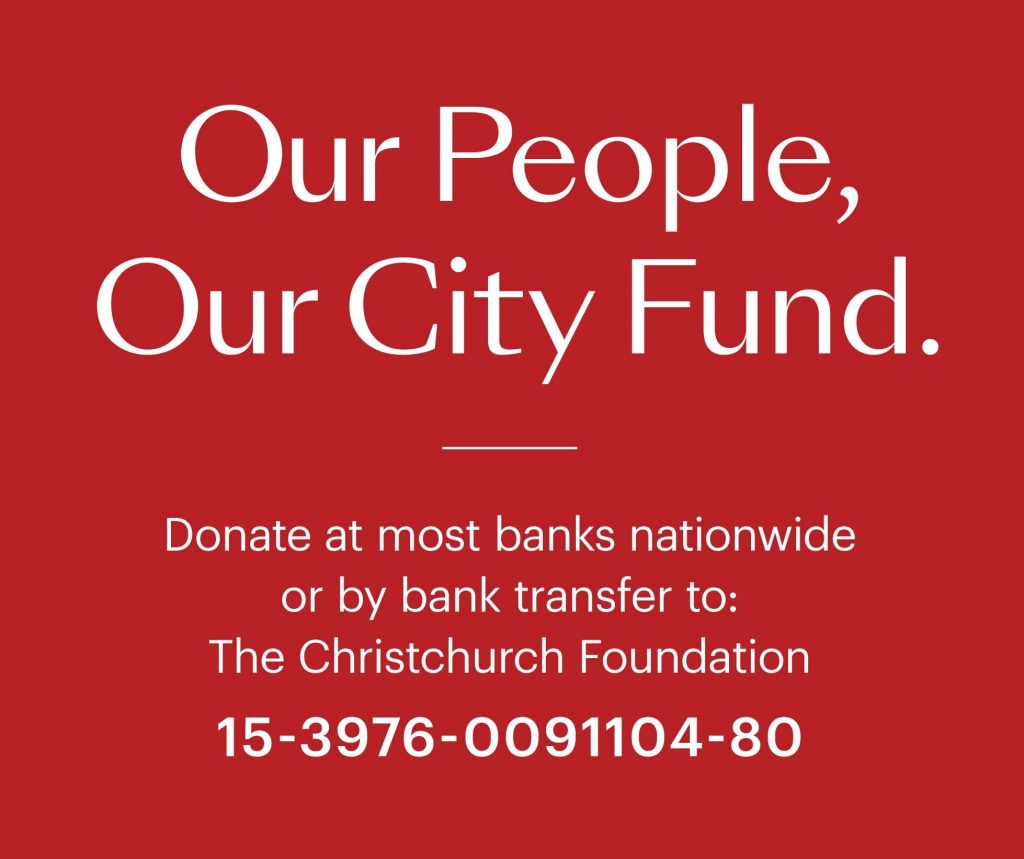The banking industry has today contributed $1 million to the Christchurch Foundation’s Our People, Our City Fund to meet the long and short term needs of the families most affected by Friday’s terror attacks.
New Zealand Bankers’ Association chair David McLean said the industry shared the sense of shock of all New Zealanders and wants to support the families now and in the future.
“The banking industry is appalled by the horrific attacks in Christchurch on Friday and stands alongside Cantabrians at this terrible time.”
Finance Minister Grant Robertson acknowledged the “generous contribution” from New Zealand’s banks to support families who are going through immeasurable grief and suffering.
“This stands alongside the generosity of individual New Zealanders supporting the people affected by this attack,” Grant Robertson said.
David McLean said the contribution came from across the banking sector.
“New Zealand Bankers’ Association members have committed $1 million to the Our People, Our City Fund, which will meet the immediate and long term needs of the families most directly affected. New Zealanders can join us in donating to this important cause. Donations can be made at most banks around New Zealand.
“Those who have lost loved ones should contact their bank to see how they can be best supported during this difficult time.”
Amy Carter, chief executive of the Christchurch Foundation, welcomed this initiative.
“The Christchurch Foundation is pleased to be working with the NZBA and its members to support the families of this tragic event, both now and into the future. A contribution of this scale is incredibly generous. Thank you to the banks and the NZBA.”
The account number to donate to is: 15-3976-0091104-80. Donations can be made online or at most bank branches.
The banking industry’s contribution to the Our People, Our City Fund has been made in accordance with Islamic principles and in consultation with the Muslim community.
More information about the Christchurch Foundation is available here:
https://christchurchfoundation.org.nz/
ENDS

Protect access to your banking by using strong, unique and secure passwords. That’s the New Zealand Bankers’ Association’s message in support of CERT NZ’s Get Password Smart campaign that kicks off today.
“We all have a role to play in preventing financial crime by protecting unauthorised access to our bank accounts. Being smart about your online banking password is an important way you can do that,” says New Zealand Bankers’ Association chief executive Roger Beaumont.
Three easy ways to be password smart and foil the fraudsters are to:
- Create strong passwords
- Use unique passwords, and
- Keep your passwords secret.
“Long passwords are strong passwords. Use four or more words to make up your passwords. Use a sentence or fun phrase that’s unique to you. You can strengthen your password further by using a mix of numbers, symbols and letters. For example, myB@nkLovesme.
“Given that we use passwords for more than online banking, it’s also a good idea to use different passwords for each of your online accounts. That way, if an attacker gets hold of one of your passwords, they won’t be able to access all of your accounts.
“And always keep your password secret. Don’t tell anyone. That includes family, friends and the police. Bank staff will never ask you to tell them your password in a branch, over the phone, or by email.”
For more information about keeping yourself safe from online scams, see: https://www.nzba.org.nz/consumer-information/fraud-protection/how-to-keep-yourself-safe-from-online-scams/.
For information about CERT NZ’s campaign, see: https://www.cert.govt.nz/password-smart/.
ENDS
Ministry of Business, Innovation and Employment
Ministry of Business, Innovation and Employment
“I think the real opportunity for the banking industry in NZ is to tell our story better because I think there is a really good story to tell.”
“While the FMA and RBNZ review into banking conduct last year found no evidence of widespread misconduct, the industry believes that trust is central to customer relationships and welcomes any moves to improve this.”
“We will also work closely with the government on the recently announced fast-tracking of regulation for further customer protection in the financial sector.”
Treasury and the Reserve Bank of New Zealand
Priority amounts are a dollar amount that mortgagees set in their mortgage terms and conditions, set by banks’ internal credit policies. The dollar amount reflects the maximum amount that the mortgagee can recover ahead of other mortgagees if there is a mortgagee sale.
Roger Beaumont has today been named as Chief Executive of the New Zealand Bankers’ Association, the organisation that represents the New Zealand banking industry.
NZBA Chair David McLean, CEO of Westpac, says they are delighted to have been able to appoint someone with such strong credentials in both the banking sector and stakeholder management area, which Roger possesses.
“Roger has an extensive career at an executive level in banking, corporate affairs and media, and is extremely well respected within both the public and private sectors of New Zealand, which is important in a role such as this.”
David McLean also acknowledges the superb job done by current Acting Chief Executive Antony Buick-Constable.
“Antony and the team have worked through a number of serious issues and reviews in recent times, and I particularly want to acknowledge the work they have done in the area of financial inclusion.
“The banking industry as a whole is facing many ongoing challenges around competition, regulation and cyber security. The Bankers’ Association has an extremely important job to do to ensure all stakeholders, and customers have confidence in the work we undertake.”
Roger Beaumont will take up his new position on 21 January 2019.
ENDS
